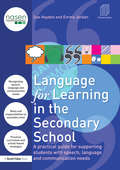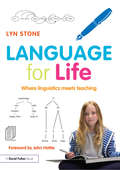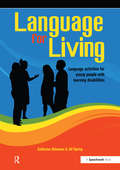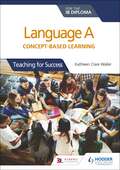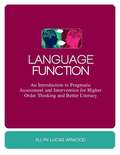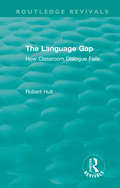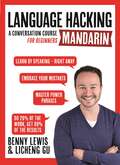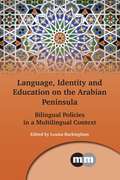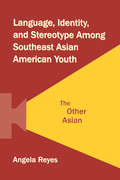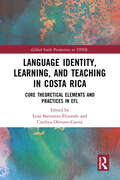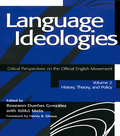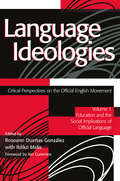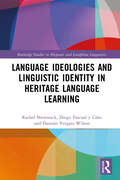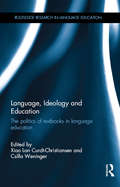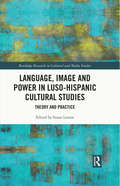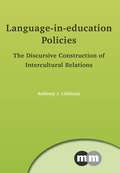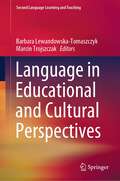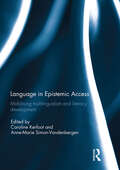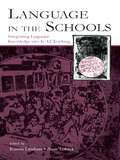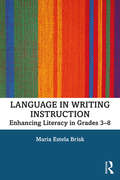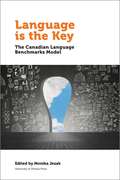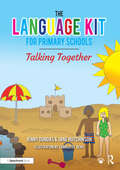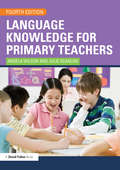- Table View
- List View
Language for Learning in the Secondary School: A Practical Guide for Supporting Students with Speech, Language and Communication Needs (nasen spotlight)
by Sue Hayden Emma JordanLanguage for Learning in the Secondary School employs the same easy-to-use format as the best-selling Primary version of this book but has been adapted to meet the specific needs of secondary school teachers. This indispensable resource is packed full of practical suggestions on how to support students with speech, language and communication difficulties. Colour coded throughout for easy referencing, this unique book supports inclusive practice by helping you to: Identify students with speech, language and communication needs Understand how language is processed Consider roles and responsibilities at secondary level Plan a differentiated curriculum Consider the language demands across the subjects Adopt a whole school approach Make use of a wide range of positive strategies Empower students to access the curriculum. Language for Learning in the Secondary School comes complete with a wealth of photocopiable resources and activities, giving teachers and teaching assistants the confidence to help students with speech, language and communication needs more effectively in mainstream settings. It will also be an extremely useful resource for specialist teachers, speech and language therapists and educational psychologists.
Language for Life: Where linguistics meets teaching
by Lyn StoneWe all recognise how important first impressions are, something often formed by how well we speak and write. Language for Life shows how language can be mastered by children and how what they have learned can be carried throughout their lives. This indispensable guidebook for teachers arms pupils with the mental skill of thinking about language. This in turn helps children learn much more easily from the language around them. This book delivers explicit, step-by-step English language instruction via lessons in syntax, grammar, morphology, etymology and punctuation. Language for Life is a proven programme that is built upon years of experience. Lyn Stone’s pragmatic and modern approach is supported by feedback from teachers and pupils alike who have attended her numerous classes and workshops. Language for Life turns important research findings into evidence-based, effective classroom practice. This book helps teachers: learn more about language structure guide the development of skills to write accurately and in increasing volume support the emergence of clear and organised thinking for writing help pupils reach their full potential as readers and writers. Brimming with vital information suitable for both basic and advanced level students, this book is an essential tool for all teachers wishing to give their pupils the best preparation possible to meet the demands of the modern world. Photocopiable worksheets throughout the book put teachers in the position of linguistic expert, guiding pupils through an enriching journey of language discovery and creativity.
Language for Living: Communication Activities for Young Adults with Learning Difficulties
by Catherine DelamainThis title features communication activities for young adults with learning difficulties. This unique collection of 180 enjoyable group activities aims to foster both the skills underlying communication, such as body language and awareness of others, and aspects of spoken language itself. The activities fall broadly within the Entry Levels 1-3 of the Skills for Life Core Curriculum, but can be used as a completely independent programme. The book addresses the needs of students with very varied skill levels, and includes some activities which can be used with non-verbal students. "Language for Living" has the following advantages: no formal assessment necessary; equipment not required or kept to a minimum; activities can be freely adapted to suit students' lifestyles and experience; activities are simple to organise, and easy to fit in to the daily programme of college, day or residential settings; photocopiable resource section; and CD-ROM for optional record-keeping and printable resources.
Language A for the IB Diploma: Teaching for Success
by Kathleen Clare WallerConfidently navigate the new syllabus with a variety of teaching resources to help you plan engaging syllabi, timelines and lessons that are aligned to the concept-based learning approach.- Confidently teach the two new courses with a clear overview of concept-based learning and inquiry and how these can be aligned to the assessment objectives and learning outcomes- Easily navigate the new courses and plan your teaching with a variety of templates, timelines and charts- Develop a concept-based learning course with specific advice and lessons that help students understand the texts and topics more deeply- Help guide students through the assessment process with advice and examples covering each assessment - Learner Portfolios & the Individual Oral, HL Essay, Paper 1 and Paper 2
Language A for the IB Diploma: Teaching for Success
by Kathleen Clare WallerConfidently navigate the new syllabus with a variety of teaching resources to help you plan engaging syllabi, timelines and lessons that are aligned to the concept-based learning approach.- Confidently teach the two new courses with a clear overview of concept-based learning and inquiry and how these can be aligned to the assessment objectives and learning outcomes- Easily navigate the new courses and plan your teaching with a variety of templates, timelines and charts- Develop a concept-based learning course with specific advice and lessons that help students understand the texts and topics more deeply- Help guide students through the assessment process with advice and examples covering each assessment - Learner Portfolios & the Individual Oral, HL Essay, Paper 1 and Paper 2
Language Function
by Ellyn Lucas ArwoodLiteracy teaching tends to take a structural approach to language, focusing on auditory products or skills such as sounds, morphemes, words, sentences, and vocabulary. However, new research suggests that the majority of English speakers actually think and learn in visual concepts, and that there is a cultural and linguistic mismatch between auditory teaching methods and the way students think and learn. This has important implications for all educators including those who work with students with neurogenic disabilities, such as autism spectrum disorders and ADHD. In her new book, Dr. Ellyn Lucas Arwood outlines a revolutionary four-tiered model of how a learner acquires language, and suggests ways to impose visual language functions onto an auditory language like English in order to improve learning for both neurotypical learners and those with neurogenic disabilities. Dr. Arwood provides tried-and-tested intervention strategies that work with all levels of ability, giving readers the knowledge and confidence to teach learners to become more literate in a way that raises learners' abilities to think and problem solve. This book takes a fresh look at how language and literacy interact, and will be of interest to educators and special educators, speech and language pathologists, and other professionals who support language learning and development.
The Language Gap: How Classroom Dialogue Fails (Routledge Revivals)
by Robert HullPublished in 1985. Dialogue between teacher and pupil is a crucial factor in the learning experience. This book questions the role of language as a ‘natural’ vehicle for learning and considers how it may, in fact, hinder communication. In a detailed examination of day-to-day language practices across a range of subjects, including English, History, Maths and Remedial teaching, in a particular comprehensive school, Robert Hull develops a powerful and coherent critique of the closed and limiting nature of the language employed by classroom teachers. By analysing the texts of school knowledge – worksheets, textbooks and teacher’s talk – and relating pupils’ views and responses to teachers’ intentions and attitudes, he indicates how pupils are denied access to that knowledge, and prevented from sharing their own, by those very practices which are intended to facilitate learning – talk which actually gets in the way of learning. Written by a schoolteacher for schoolteachers, this book should help any training or practising teacher in the primary or secondary context concerned with the crucial relationship between language and learning to develop an alternative approach, and so make better sense in the classroom.
LANGUAGE HACKING MANDARIN (Learn How to Speak Mandarin - Right Away): A Conversation Course for Beginners
by Benny LewisCrack the Code and Get Fluent Faster!"I had to learn [a new language] in a handful of days for a TV interview. I asked Benny for help and his advice was invaluable." - Tim Ferriss What if you could skip the years of study and jump right to speaking Mandarin? Sound Crazy? No, it's language hacking. It's about learning what's indispensable, skipping what's not - and using what you've learned to have real conversations in Mandarin - from day one!Unlike most traditional language courses that try to teach you the rules of a language, Language Hacking Mandarin, shows you how to learn and speak Mandarin immediately through proven memory techniques, unconventional shortcuts and conversation strategies perfect by one of the world's greatest language learners, Benny Lewis, aka the Irish Polyglot. The Method Language Hacking takes a modern approach to language learning, blending the power of online social collaboration and the 80/20 principle of learning (Benny's ten #languagehacks show you how to achieve more with less!). It focuses on the conversations and language that learners need to master right away, rather than presenting language in the order of difficulty like most courses. This means you can start having conversations immediately. Course FeaturesEach of the 10 units culminates with a speaking mission that you can choose to share on the italki Language Hacking learner community (www.italki.com/languagehacking) where you can give and get feedback and extend your learning beyond the pages of the book. The audio for this course is available for free on library.teachyourself.com or from the Teach Yourself Library app.You don't need to go abroad to learn a language any more.
Language, Identity and Education on the Arabian Peninsula: Bilingual Policies in a Multilingual Context
by Louisa BuckinghamThis collection examines the urban multilingual realities of inhabitants of the Arabian Peninsula in the early 21st century from the perspectives of learners, teachers and researchers. Focusing on both public and private spheres, it considers the importance of both English and immigrants' languages in a context of rapid socioeconomic development. Extending beyond English-Arabic societal bilingualism, the language practices of the Peninsula's citizens and residents serve multiple purposes in their daily lived realities. Chapters on home and heritage languages, identity, ELT, commercial signage and academic publishing contribute to a deepening understanding of the inherent linguistic diversity in these dynamic societies.
Language, Identity, and Stereotype Among Southeast Asian American Youth: The Other Asian
by Angela ReyesThis book—an ethnographic and discourse analytic study of an after-school video-making project for 1.5- and second-generation Southeast Asian American teenagers—explores the relationships among stereotype, identity, and ethnicity that emerge in this informal educational setting. Working from a unique theoretical foundation that combines linguistic anthropology, Asian American studies, and education, and using rigorous linguistic anthropological tools to closely examine video- and audio- recorded interactions gathered during the video-making project (in which teen participants learned the skills for creating their own video and adult staff learned to respect and value the local knowledge of youth), the author builds a compelling link between micro-level uses of language and macro-level discourses of identity, race, ethnicity, and culture. In this study of the ways in which teens draw on and play with circulating stereotypes of the self and the other, Reyes uniquely illustrates how individuals can reappropriate stereotypes of their ethnic group as a resource to position themselves and others in interactionally meaningful ways, to accomplish new social actions, and to assign new meanings to stereotypes. This is an important book for academics and students in sociolinguistics, linguistic anthropology, discourse analysis, and applied linguistics with an interest in issues of youth, race, and ethnicity, and/or educational settings, and will also be of interest to readers in the fields of education, Asian American studies, social psychology, and sociology.
Language Identity, Learning, and Teaching in Costa Rica: Core Theoretical Elements and Practices in EFL (Global South Perspectives on TESOL)
by Lena Barrantes-Elizondo Cinthya Olivares-GaritaThis edited collection provides a comprehensive and locally situated understanding of English language teaching from the perspective of dedicated and experienced language professionals and researchers in Costa Rica. The book uses a series of reflective sections that interconnect theory and practice in a non-English-dominant context in order to inform and transform pedagogical practices. The chapters depict a wide-ranging image of English language teaching and learning in the region, encouraging in-service teachers, TESOL specialists, and ELT scholars to critically reassess, rethink, and relearn teaching and learning as more than a political decision in an educational curriculum. Ultimately promoting the practice as dynamic, ever-changing, and culturally situated, the book will be highly relevant to researchers, academics, scholars, and faculty in the fields of teacher education, educational research, EFL, and modern foreign languages.
Language Ideologies: Critical Perspectives on the Official English Movement, Volume II: History, Theory, and Policy
by Roseann Dueñas González Ildikó MelisFirst published in 2001. Routledge is an imprint of Taylor & Francis, an informa company.
Language Ideologies: Critical Perspectives on the Official English Movement, Volume I: Education and the Social Implications of Official Language
by ROSEANN DUEÑAS GONZÁLEZ; ILDIKÓ MELISHow do educators balance the rights of the rapidly growing percentage of the United States' population whose first language is not English or whose English differs from standard usage with the rights of the majority of students whose first and generally only language is English? This two-volume set addresses the complicated and divisive issues at the heart of the debate over language diversity and the English Only movement in the U.S. public education. Blending social, political, and legal analyses of the ideologies of language with perspectives on the impact of the English Only movement on education and on classrooms at all levels, Language Ideologies: Critical Perspectives on the Official English Movement offers a wide range of perspectives that teachers and literacy advocates can use to inform practice as well as policy. This exhaustive, two-volume collection not only updates existing information on the English Only movement in the United States, but also includes the international context, looking at the emergence of English as a world language through a postcolonial lens. The complexity of the debate is also reflected in the exceptionally diverse list of contributors, who speak from varying disciplines and backgrounds including sociology, linguistics, university administration, the ACLU, law, ESL, and English. Both volumes explore the political, legislative, and social implications of language ideologies. Volume 1: Education and the Social Implications of Official Language focuses in particular on the consequences for the classroom. In Volume 2: History, Theory, and Policy, the focus is on the implications for policymakers and language-program administrators.
Language Ideologies and Linguistic Identity in Heritage Language Learning (Routledge Studies in Hispanic and Lusophone Linguistics)
by Rachel Showstack Diego Pascual y Cabo Damián Vergara WilsonLanguage Ideologies and Linguistic Identity in Heritage Language Learning addresses the ways in which discourses about language value and identities of linguistic expertise are constructed and negotiated in the Spanish heritage language (HL) classroom, and how the classroom discourse shapes, and is shaped by, the world outside of the classroom.The volume examines the sociopolitical contexts, personal histories, and communicative practices of Spanish teachers and students in two diverse geographic regions: the US states of Texas and Kansas. Adopting an integrated sociocultural approach, it considers the ways in which individuals draw from multiple linguistic resources and social practices in daily interaction and how they articulate their beliefs about language through storytelling. Rich interactional data, examples from social media, and stories of community engagement are utilized to demonstrate how Spanish heritage speakers use language creatively and proactively to legitimize and claim power in their home and community linguistic practices.This is an invaluable resource for applied linguists who seek to better understand the relationship between language, ideology, and identity and for graduate students and researchers in the fields of linguistics, Spanish, and HL education.
Language, Ideology and Education: The politics of textbooks in language education (Routledge Research in Language Education)
by Csilla Weninger Xiao Lan Curdt-ChristiansenThis book examines the role textbooks play in the teaching of dominant and non-dominant (first and foreign) languages in a range of cultural contexts worldwide. Each chapter addresses important issues related to what constitutes "legitimate knowledge", the politics of learning materials, global cultural awareness, competing ideologies, and the development of multilingual literacies. Language, Ideology and Education: The Politics of Textbooks in Language Education comprehensively surveys theoretical perspectives and methodological issues in the critical examination of language textbooks. In particular, it looks at: The Cultural Politics of Language Textbooks in the Era of Globalization The Politics of Instructional Materials for English for Young Learners Ideological Tensions and Contradictions in Lower Primary English Teaching Materials in Singapore Creating a Multilingual/multicultural Space in Japanese EFL: A Critical Analysis of Discursive Practices within a New Language Education Policy The book is primarily addressed to those who teach and research in the areas of Foreign Language Education, TESOL, Applied Linguistics, Language Policy, Critical Pedagogy, and Textual Cultures. Although the book is focused on textbook and materials analysis, rather than evaluation, most chapters discuss implications for curriculum design and materials development and therefore will be relevant to scholars working in those fields.
Language, Image and Power in Luso-Hispanic Cultural Studies: Theory and Practice (Routledge Research in Cultural and Media Studies)
by Susan LarsonThis volume explores the history, evolution, and future of Luso-Hispanic Cultural Studies as a discipline, a pedagogical tool, and a set of working practices by bringing together a diverse group of renowned specialists to examine how the field has grown out of and radically reconsidered some of the basic premises of British Cultural Studies since the 1950s to address the many cultures of the Spanish and Portuguese-speaking world. The chapters in this volume address How Cultural Studies is being practiced in the increasingly virtual mediascapes of the twenty-first century What happens to basic critical assumptions about culture and power after they have passed through the filter of Post-Colonial and Decolonial Studies of the Luso-Hispanic world How we understand the role of culture in light of recent experiences with radical demographic shifts, populism and civil unrest within Latin America, Iberian and the Latino U.S How new ways of practising Luso-Hispanic Cultural Studies have worked their way into our pedagogy and the structure of the curriculum in the age of the increasingly privatized neoliberal university Providing keen insight and reflection on these questions, this volume is an essential read for scholars and students of Visual and Film Studies, Latin American and Iberian Studies, Luso-Brazilian Studies, Language and Culture Pedagogy, Global Studies, and for anyone interested in Cultural Studies across the Luso-Hispanic world.
Language-in-education Policies
by Anthony J. LiddicoatThis book examines the ideological underpinnings of language-in-education policies that explicitly focus on adding a new language to the learners' existing repertoire. It examines policies for foreign languages, immigrant languages, indigenous languages and external language spread. Each of these contexts provides for different possible relationships between the language learner and the target language group and shows how in different polities different understandings influence how policy is designed. The book develops a theoretical account of language policies as discursive constructions of ideological positions and explicates how ideologies are developed through an examination of case studies from a range of countries. Each chapter in this book takes the form of a series of three in-depth case studies in which policies relating to a particular area of language-in-education policy are examined. Each case examines the language of policy texts from a critical perspective to deconstruct how intercultural relationships are projected.
Language in Educational and Cultural Perspectives (Second Language Learning and Teaching)
by Barbara Lewandowska-Tomaszczyk Marcin TrojszczakThis book comprises 20 chapters that have been divided into two distinct parts: language in educational contexts and language in cultural contexts. The contributions included in this book are the outcome of the conference Contacts and Contrasts that was held in Konin, Poland, in 2021 (C&C2021). The contributions featured in the first part of the part of the book focus on various issues in the field of applied linguistics, in particular language education, second and foreign language learning as well as translator training. The second part of this edited collection features chapters devoted to a range of issues at the intersection of semantics, historical and contact linguistics, as well as literature.
Language in Epistemic Access: Mobilising multilingualism and literacy development
by Caroline Kerfoot Anne-Marie Simon-VandenbergenThis book focuses on how to address persistent linguistically structured inequalities in education, primarily in relation to South African schools, but also in conversation with Australian work and with resonances for other multilingual contexts around the world. The book as a whole lays bare the tension between the commitment to multilingualism enshrined in the South African Constitution and language-in-education policy, and the realities of the dominance of English and the virtual absence of indigenous African languages in current educational practices. It suggests that dynamic plurilingual pedagogies can be allied with the explicit scaffolding of genre-based pedagogies to help redress asymmetries in epistemic access and to re-imagine policies, pedagogies, and practices more in tune with the realities of multilingual classrooms. The contributions to this book offer complementary insights on routes to improving access to school knowledge, especially for learners whose home language or language variety is different to that of teaching and learning at school. All subscribe to similar ideologies which include the view that multilingualism should be seen as a resource rather than a 'problem' in education. Commentaries on these chapters highlight evidence-based high-impact educational responses, and suggest that translanguaging and genre may well offer opportunities for students to expand their linguistic repertoires and to bridge epistemological differences between community and school. This book was originally published as a special issue of Language and Education.
Language in the Schools: Integrating Linguistic Knowledge Into K-12 Teaching
by Kristin Denham and Anne LobeckLanguage in the Schools: Integrating Linguistic Knowledge Into K-12 Teaching addresses two important questions:*What aspects of linguistic knowledge are most useful for teachers to know?*What kinds of activities and projects are most effective in introducing those aspects of linguistic knowledge to K-12 students?The volume focuses on how basic linguistic knowledge can inform teachers' approaches to language issues in the multicultural, linguistically diverse classroom. The text also includes examples of practical applications of language awareness to pedagogy, assessment, and curriculum construction, which support the current goals of language arts, bilingual, and ESL education.Language in the Schools: Integrating Linguistic Knowledge Into K-12 Teaching contributes to the resources on linguistics and education by taking prospective teachers beyond basic linguistics to ways in which linguistics can productively inform their teaching and raise their students' awareness of language. It is intended as a text for students in teacher education programs who have a basic knowledge of linguistics.
Language in Writing Instruction: Enhancing Literacy in Grades 3-8
by María Estela BriskAccessible and engaging, this book offers a comfortable entry point to integrating language instruction in writing units in grades 3–8. A full understanding of language development is necessary for teaching writing in a successful and meaningful way. Applying a Systemic Functional Linguistics (SFL) approach, María Brisk embraces an educator’s perspective, breaks down the challenges of teaching language for non-linguists, and demonstrates how teachers can help students express their ideas and create cohesive texts. With a focus on the needs of all students, including bilingual and English language learners, Brisk addresses topics necessary for successful language instruction, and moves beyond vocabulary and grammar to address meaning-making and genre. This book provides a wealth of tools and examples for practice and includes helpful instructional resources that teachers can return to time after time. Moving from theory to practice, this teacher-friendly text is a vital resource for courses in language education programs, in-service teacher-training seminars, and for pre-service and practicing English Language Arts (ELA) teachers who want to expand their teaching abilities and knowledge bases. This book features a sample unit and a reference list of instructional resources.
Language Instruction for Students with Disabilities (3rd edition)
by Edward A. Polloway Lynda Miller Tom E. C. SmithLanguage development and language competence are recognized as critical emphases in the education of all children, and certainly those who experience disabilities. The substantial amount of research and programming in the diverse fields within the language domain reflects this emphasis.
Language is the Key: The Canadian Language Benchmarks Model (Politics and Public Policy)
by Monika JezakThe CLB/NCLC success was dependent on many factors—outstanding work by leading Canadian scholars; steady commitment of the government and non-governmental stakeholders at the federal, provincial, and local level; and, last but not least, unconditional commitment and caring on the part of an invested community of practice. Language is the key covers a range of topics: historical and political context that lead to the development of the Canadian standards, their current positioning in global educational markets, as well as their research and teaching cultures. This edited volume provides a comprehensive overview of recent and ongoing projects and of CLB- and NCLC-related materials, tools and resources for teaching and assessment. Finally, it offers a bold outlook, proposing various scenarios to branch out beyond these benchmarks into the domains of higher education, essential skills, literacy, workplace training, as well as international and indigenous languages. The 20th anniversary of the CLB/NCLC provides an opportunity to reflect on the scope and importance of this exceptional Canadian intellectual product.
The Language Kit for Primary Schools: Talking Together
by Jenny Dundas Jane HutchinsonThe Language Kit for Primary Schools is a comprehensive toolkit for teachers, SENCOs and teaching assistants who deliver group interventions in order to support language and communication in schools. Key features of the kit include: suggested strategies with clear guidelines to help practitioners to support spoken language difficulties; detailed instructions describing how to run and deliver language groups to maximize effectiveness; and, two intervention programmes including session plans, structured activities and photocopiable handouts, ensuring that everything necessary to run the group is in one place. Programmes are: a ten week programme for use with Key Stage 1 pupils. This may also be used with Foundation Stage children; a ten week programme for use with Key Stage 2 pupils. This may also be used with Key Stage 3 students; suggestions for simplifying or extending every activity, enabling the practitioner to differentiate and meet the needs of everyone in the group; an additional resource bank and activity ideas to allow further development of language groups. Written in a clear and concise style by a Speech and Language Therapist and a Specialist teacher of Speech, Language and Communication, this resource will allow practitioners to give pupils the best possible language support.
Language Knowledge for Primary Teachers: A Guide To Textual, Grammatical And Lexical Study
by Angela Wilson Julie ScanlonTeaching children to develop as language users is one of the most important tasks of a primary school teacher. However, many trainee teachers begin their careers with a low knowledge base. Language Knowledge for Primary Teachers is the reader friendly guide designed to address this. This book provides a clear explanation of the knowledge and understanding required by teachers to implement the objectives of the National Curriculum for English. It reveals how an explicit knowledge of language can enrich their own and their children’s spoken English. It will give teachers confidence in developing children’s enjoyment and comprehension of reading and writing so children can use their language skills in the real world. Updated to include references to the new curriculum, this book explores: The importance of subject knowledge in supporting children in language and literacy; Language knowledge within the context of authentic and meaningful texts, from fiction to ‘Facebook’; The links between subject knowledge and real teaching situations; New areas on talk and dialogic learning; Increased emphasis on ICT and cross-curricular study. This book will appeal to all trainee and newly qualified teachers needing to achieve both the demands of subject knowledge for Qualified Teacher Status, and a firm understanding of the expectations of the National Curriculum for English.
